#ERP Solution For Manufacturing Industry
Text
Boosting Efficiency: The Role of ERP Software in Modern Manufacturing Operations
In today's fast-paced manufacturing landscape, efficiency is not just a desirable trait; it's a necessity. To stay competitive and meet the demands of the market, manufacturers must streamline their processes, optimize resource utilization, and enhance decision-making capabilities. This is where Enterprise Resource Planning (ERP) software steps in as a game-changer. In this article, we'll delve into the pivotal role of ERP systems in revolutionizing manufacturing operations, particularly in India's thriving industrial sector.
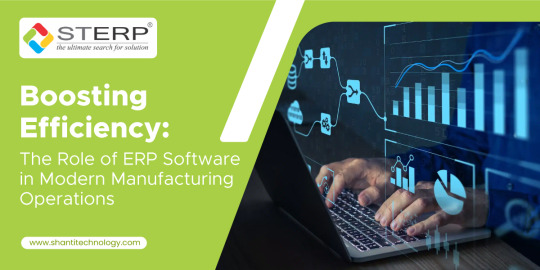
Understanding ERP for Manufacturing Industry
ERP systems for manufacturing are comprehensive software solutions designed to integrate and automate core business processes such as production planning, inventory management, supply chain logistics, financial management, and human resources. By consolidating data and operations into a unified platform, ERP empowers manufacturers with real-time insights, facilitates collaboration across departments, and enables informed decision-making.
Streamlining Operations with ERP Solutions
In the dynamic environment of manufacturing, where every minute counts, efficiency gains translate directly into cost savings and competitive advantages. ERP software for manufacturing offers a multitude of features that streamline operations and drive efficiency:
1. Enhanced Production Planning: ERP systems enable manufacturers to create accurate production schedules based on demand forecasts, resource availability, and production capacity. By optimizing production timelines and minimizing idle time, manufacturers can fulfill orders promptly and reduce lead times.
2. Inventory Management: Efficient inventory management is crucial for balancing supply and demand while minimizing holding costs. ERP software provides real-time visibility into inventory levels, automates reorder points, and facilitates inventory optimization to prevent stockouts and overstock situations.
3. Supply Chain Optimization: ERP solutions for manufacturing integrate supply chain processes from procurement to distribution, enabling seamless coordination with suppliers and distributors. By optimizing procurement cycles, minimizing transportation costs, and reducing lead times, manufacturers can enhance supply chain resilience and responsiveness.
4. Quality Control: Maintaining product quality is paramount in manufacturing to uphold brand reputation and customer satisfaction. ERP systems offer quality management modules that streamline inspection processes, track product defects, and facilitate corrective actions to ensure adherence to quality standards.
5. Financial Management: Effective financial management is essential for sustaining manufacturing operations and driving profitability. ERP software provides robust accounting modules that automate financial transactions, streamline budgeting and forecasting, and generate comprehensive financial reports for informed decision-making.
6. Human Resource Management: People are the cornerstone of manufacturing operations, and managing workforce efficiently is critical for productivity and employee satisfaction. ERP systems for manufacturing include HR modules that automate payroll processing, manage employee records, and facilitate workforce planning to align staffing levels with production demands.
The Advantages of ERP for Manufacturing Companies in India
India's manufacturing sector is undergoing rapid transformation, fueled by factors such as government initiatives like "Make in India," technological advancements, and globalization. In this dynamic landscape, ERP software plays a pivotal role in empowering manufacturing companies to thrive and remain competitive:
1. Scalability: ERP solutions for manufacturing are scalable, making them suitable for companies of all sizes – from small and medium enterprises (SMEs) to large conglomerates. Whether a company is expanding its operations or diversifying its product portfolio, ERP systems can adapt to evolving business needs and support growth.
2. Compliance: Regulatory compliance is a significant concern for manufacturing companies in India, given the complex regulatory environment. ERP software incorporates compliance features that ensure adherence to industry regulations, tax laws, and reporting requirements, minimizing the risk of non-compliance penalties.
3. Localization: ERP vendors catering to the Indian manufacturing sector offer localized solutions tailored to the unique requirements of the Indian market. From multi-currency support to GST compliance features, these ERP systems are equipped with functionalities that address the specific challenges faced by Indian manufacturers.
4. Cost Efficiency: Implementing ERP software for manufacturing entails upfront investment, but the long-term benefits far outweigh the costs. By streamlining processes, optimizing resource utilization, and reducing operational inefficiencies, ERP systems drive cost savings and improve overall profitability.
5. Competitive Edge: In a fiercely competitive market, manufacturing companies in India must differentiate themselves through operational excellence and agility. ERP software equips companies with the tools and insights needed to outperform competitors, adapt to market dynamics, and capitalize on emerging opportunities.
Choosing the Right ERP Software for Manufacturing
Selecting the right ERP solution is crucial for maximizing the benefits and ensuring a smooth implementation process. When evaluating ERP software for manufacturing, companies should consider the following factors:
1. Industry-specific functionality: Choose an ERP system that offers industry-specific features and functionalities tailored to the unique requirements of manufacturing operations.
2. Scalability and flexibility: Ensure that the ERP software can scale with your business and accommodate future growth and expansion.
3. Ease of integration: Look for ERP systems that seamlessly integrate with existing software applications, such as CRM systems, MES solutions, and IoT devices, to create a cohesive technology ecosystem.
4. User-friendliness: A user-friendly interface and intuitive navigation are essential for ensuring widespread adoption and maximizing user productivity.
5. Vendor support and expertise: Select a reputable ERP vendor with a proven track record of success in the manufacturing industry and robust customer support services.
Conclusion
In conclusion, ERP software has emerged as a cornerstone of modern manufacturing operations, empowering companies to enhance efficiency, drive growth, and maintain a competitive edge in the global market. For manufacturing companies in India, where agility, scalability, and compliance are paramount, implementing the right ERP solution can be a transformative investment that paves the way for sustainable success. By harnessing the power of ERP, manufacturers can optimize processes, streamline operations, and unlock new opportunities for innovation and growth in the dynamic landscape of the manufacturing industry.
#ERP software providers in India#Manufacturing enterprise resource planning#ERP systems for manufacturing companies#ERP system for manufacturing industry#ERP for manufacturing companies#ERP software for engineering company#ERP software for engineering companies in India#ERP software for engineering companies in Mumbai#ERP solution providers in India#ERP for manufacturing industry#ERP systems for manufacturing#ERP solutions for manufacturing#ERP software manufacturing industry#ERP for manufacturing company in India#India
7 notes
·
View notes
Text
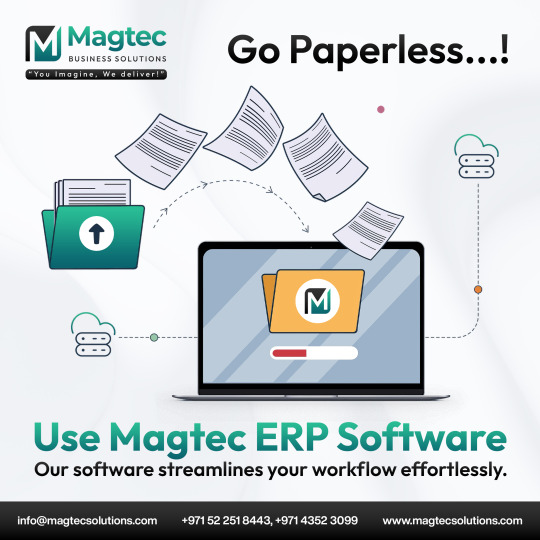
Tired of paper piles? 🚫 Go paperless with Magtec ERP Software! 💻 Streamline your workflow and boost efficiency. It's time to embrace the digital future.
#erp#business#software#management#automation#enterprise#resources#planning#solution#system#cloud#industry#finance#accounting#supplychain#inventory#crm#hr#manufacturing#distribution#retail#healthcare#education#hospitality#smallbusiness#mediumenterprise#largeenterprise#magtecerp#magtec#magtecsolutions
2 notes
·
View notes
Text
ERP Trends 2024: What Engineering and Manufacturing Industries Need to Know
As we navigate through 2024, the landscape of Enterprise Resource Planning (ERP) systems continues to evolve, presenting both opportunities and challenges for engineering and manufacturing industries. Companies in this sector, especially those in key industrial regions like Maharashtra, Mumbai, Pune, and Gujarat, must stay abreast of the latest ERP trends to maintain competitive advantage and operational efficiency. In this blog, we’ll delve into the significant ERP trends of 2024 and their implications for the engineering and manufacturing sectors.
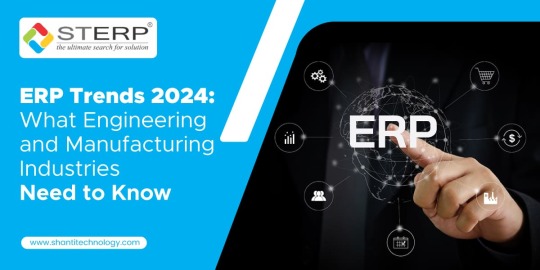
1. Increased Adoption of Cloud-Based ERP Solutions
One of the most significant trends in ERP software for engineering companies in Maharashtra and across India is the shift towards cloud-based solutions. Cloud ERP offers several advantages over traditional on-premise systems, including lower upfront costs, greater scalability, and enhanced accessibility.
Benefits of Cloud-Based ERP:
Cost Efficiency: Eliminates the need for expensive hardware and reduces IT maintenance costs.
Scalability: Easily adjusts to the growing needs of a manufacturing company in Gujarat or an engineering firm in Mumbai.
Accessibility: Provides access to real-time data from anywhere, facilitating better decision-making.
Leading ERP software companies in Pune are increasingly offering cloud-based solutions tailored to the needs of local engineering and manufacturing businesses. These solutions support remote work and ensure business continuity in an increasingly digital world.
2. Integration of AI and Machine Learning
Artificial Intelligence (AI) and Machine Learning (ML) are revolutionizing ERP systems by providing intelligent insights and automating routine tasks. For ERP software for engineering companies in Mumbai, integrating AI can enhance predictive maintenance, optimize supply chain management, and improve production planning.
AI and ML Applications in ERP:
Predictive Analytics: Helps foresee equipment failures and reduce downtime.
Supply Chain Optimization: Enhances demand forecasting and inventory management.
Process Automation: Automates repetitive tasks, freeing up human resources for more strategic roles.
ERP solution providers in Pune are at the forefront of integrating AI and ML into their systems, enabling companies to leverage advanced analytics and improve overall operational efficiency.
3. Emphasis on Cybersecurity
With the increasing digitization of manufacturing processes, cybersecurity has become a critical concern. ERP systems, being the backbone of business operations, are prime targets for cyber-attacks. Engineering and manufacturing companies in regions like Gujarat and Maharashtra need robust cybersecurity measures to protect their sensitive data.
Key Cybersecurity Features:
Data Encryption: Protects data during transmission and storage.
Multi-Factor Authentication: Enhances user authentication processes.
Regular Security Audits: Ensures continuous monitoring and improvement of security protocols.
ERP software for engineering companies in Maharashtra must incorporate these advanced security features to safeguard against data breaches and cyber threats.
4. Enhanced User Experience (UX)
User experience has become a critical factor in ERP adoption and utilization. Modern ERP systems are focusing on intuitive interfaces and user-friendly designs to ensure that all employees, regardless of their technical expertise, can effectively use the system.
UX Improvements:
Intuitive Dashboards: Provide real-time insights and easy navigation.
Mobile Accessibility: Ensures that users can access ERP data on-the-go.
Customization Options: Allow users to tailor the system to their specific needs.
ERP software companies in Pune are prioritizing user experience in their solutions, making it easier for engineering and manufacturing firms to train their staff and increase productivity.
5. Internet of Things (IoT) Integration
The integration of IoT with ERP systems is another trend transforming the manufacturing industry. IoT devices collect vast amounts of data from production lines, equipment, and other operational areas, which can be analyzed by the ERP system to optimize performance.
IoT Benefits in ERP:
Real-Time Monitoring: Provides immediate insights into production processes.
Predictive Maintenance: Schedules maintenance activities based on equipment condition rather than time intervals.
Enhanced Quality Control: Monitors product quality throughout the manufacturing process.
For ERP for manufacturing companies in Gujarat, IoT integration offers a significant advantage by improving efficiency and reducing operational costs.
6. Sustainability and Green Manufacturing
Sustainability is becoming a critical focus for manufacturing companies worldwide. ERP systems are evolving to support green manufacturing practices by tracking and optimizing resource usage, reducing waste, and ensuring compliance with environmental regulations.
Sustainable ERP Features:
Resource Management: Tracks energy and material usage to minimize waste.
Regulatory Compliance: Ensures adherence to environmental laws and standards.
Sustainability Reporting: Provides detailed reports on sustainability metrics.
Engineering and manufacturing companies in regions like Mumbai and Maharashtra can benefit from ERP solutions that incorporate sustainability features, helping them achieve their environmental goals and enhance their corporate reputation.
7. Modular and Flexible ERP Solutions
In response to the diverse needs of engineering and manufacturing firms, ERP solution providers in Pune are developing more modular and flexible ERP systems. These systems allow companies to select and implement only the modules they need, which can be easily scaled and customized as their business grows.
Advantages of Modular ERP:
Cost-Effective: Pay only for the features you need.
Scalability: Easily add new modules as your business requirements evolve.
Customization: Tailor the system to fit specific operational needs.
This trend is particularly beneficial for small to medium-sized enterprises (SMEs) in the engineering and manufacturing sectors, enabling them to adopt ERP systems without the burden of high costs or complexity.
8. Focus on Customer-Centric Manufacturing
ERP systems are increasingly supporting customer-centric manufacturing practices, where production processes are aligned with customer needs and preferences. This approach enhances customer satisfaction and drives business growth.
Customer-Centric ERP Features:
Custom Order Management: Handles unique customer requirements and specifications.
Enhanced CRM Integration: Integrates with customer relationship management (CRM) systems for a holistic view of customer interactions.
Real-Time Order Tracking: Provides customers with real-time updates on their orders.
Manufacturing companies in Gujarat and engineering firms in Maharashtra are leveraging these customer-centric ERP features to improve their service levels and build stronger customer relationships.
9. Advanced Analytics and Business Intelligence (BI)
Advanced analytics and BI are becoming integral components of modern ERP systems. These tools provide deep insights into business operations, helping companies make data-driven decisions and improve performance.
Key BI Features:
Data Visualization: Converts complex data into easy-to-understand charts and graphs.
Dashboards: Offer a real-time overview of key performance indicators (KPIs).
Predictive Analytics: Forecasts future trends based on historical data.
ERP software companies in Pune are incorporating advanced analytics and BI capabilities into their systems, empowering engineering and manufacturing firms to gain a competitive edge through better insights and informed decision-making.
10. Globalization and Localization Support
As engineering and manufacturing companies expand their operations globally, ERP systems must support multiple languages, currencies, and regulatory requirements. Globalization and localization features are essential for companies operating in diverse markets.
Globalization Features:
Multi-Language Support: Accommodates users from different regions.
Multi-Currency Handling: Manages transactions in various currencies.
Compliance with Local Regulations: Ensures adherence to regional laws and standards.
ERP solution providers in Pune and other industrial hubs are enhancing their systems to support global operations, enabling companies to seamlessly manage their international business processes.
Conclusion
The ERP landscape for engineering and manufacturing industries is rapidly evolving, driven by advancements in technology and changing business needs. Companies in Maharashtra, Mumbai, Pune, and Gujarat must stay informed about these trends to leverage the full potential of ERP systems. By adopting cloud-based solutions, integrating AI and IoT, prioritizing cybersecurity, and focusing on sustainability, businesses can achieve greater efficiency, competitiveness, and growth in 2024 and beyond.
For engineering and manufacturing firms looking for the best ERP software for engineering companies in Maharashtra or ERP for manufacturing companies in Gujarat, it is crucial to partner with leading ERP solution providers in Pune who understand the unique challenges and opportunities in this sector. Embracing these trends will not only enhance operational efficiency but also drive innovation and sustainability in the engineering and manufacturing industries.
By staying ahead of these ERP trends, companies can position themselves for success in an increasingly digital and interconnected world. Whether you are an engineering firm in Mumbai or a manufacturing company in Gujarat, the right ERP system can transform your operations and pave the way for a prosperous future.
#ERP software in Vadodara#Manufacturing ERP software in Gujarat#ERP software companies in Vadodara#ERP software providers in Vadodara#ERP for manufacturing company in Gujarat#ERP software#ERP system#cloud ERP#ERP solutions#software development#engineering ERP#management software#engineering services#engineering industry
4 notes
·
View notes
Text
𝗥𝗲𝘃𝗼𝗹𝘂𝘁𝗶𝗼𝗻𝗶𝘇𝗲 𝗬𝗼𝘂𝗿 𝗠𝗮𝗻𝘂𝗳𝗮𝗰𝘁𝘂𝗿𝗶𝗻𝗴 𝘄𝗶𝘁𝗵 𝗔𝗜-𝗱𝗿𝗶𝘃𝗲𝗻 𝗘𝗥𝗣 𝗦𝗼𝗹𝘂𝘁𝗶𝗼𝗻𝘀!
Discover how integrating Artificial Intelligence with Enterprise Resource Planning can transform your manufacturing operations. Check out our latest blog post to explore the future of smart manufacturing:
Read more about the next wave of intelligent ERP systems and stay ahead in the digital transformation race!
https://www.codetrade.io/blog/ai-driven-erp-solutions-for-the-manufacturing-industry/
#artificial intelligence#machine learning#erp solution#manufacturing industry#ERP in AI#enterprise resource planning#intelligent ERP system#AI ML#AI-driven ERP solutions
2 notes
·
View notes
Text
SAP Business One for Chemical Industry
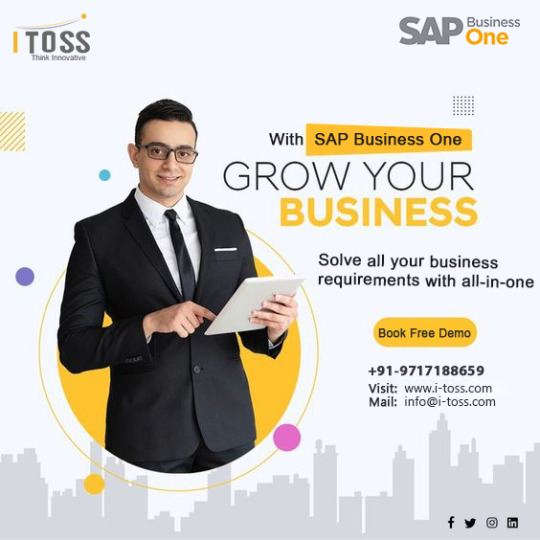
With all its benefits, global chemical manufacturing companies are incorporating SAP B1 at an increased rate for chemical production. Not only does it help in improving business efficiency and enhancing collaboration but it also aids in increasing customer satisfaction and increasing revenue by up to 10-30%. With the change in business dynamics and fluctuations in demand, robust ERP software can empower chemical businesses to take advantage of their competition while adhering to safety, quality, and compliance requirements. SAP b1 solutions are already used by nearly 6500 chemical industry businesses and more are soon to follow.
Managing costs effectively is an essential aspect of chemicals and any industry. In the chemical industry, SAP Business One provides intuitive planning and scheduling to manage time and resources efficiently and cut down on business costs to control every aspect. The cost of materials can also be estimated by analyzing the production data history and past purchases in a single click to simplify business processes. SAP chemical industry best practices optimize different processes, improve workflow efficiency, and reduce overtime costs by 48%.
#sap business one#SAP Business One Partner in India#SAP Business One partner#SAP Business One ERP Solution#SAP Business One for Manufacturers#SAP chemical industry#ERP Software#best erp software#best erp software in india#food beverage erp software#erp software for construction#erp#enterprise software#ERP Solution#SAP ERP#erp for small business#erp development company#erp consulting services#enterprise resource planning#erpsystem
2 notes
·
View notes
Text
OpenTeQ NetSuite Consulting Services: Driving Operational Excellence
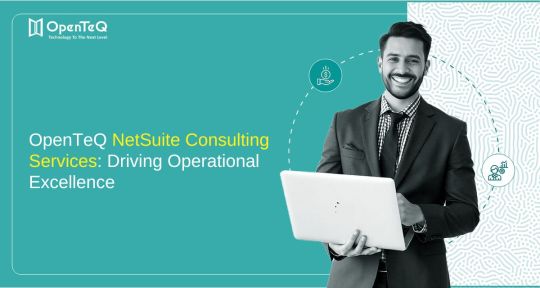
NetSuite Consulting Services offer businesses the expertise needed to maximize the benefits of their NetSuite ERP platform. From implementation to customization and optimization, these services help organizations streamline their operations and ensure seamless integration of the platform into existing workflows. NetSuite consultants work closely with businesses to assess their unique requirements and tailor solutions that address specific challenges. Their role extends beyond the initial setup, providing ongoing support and system optimization to adapt to changing business needs and growth objectives.
NetSuite Solutions Provider: Your Strategic Partner for Success
A NetSuite Solutions Provider is a certified partner with the expertise and authority to sell, implement, and manage NetSuite solutions for businesses. These providers act as strategic partners, guiding organizations through every stage of the NetSuite journey, from selecting the right package to ensuring successful deployment. The advantage of working with a NetSuite Solutions Provider lies in their deep knowledge of industry-specific challenges and best practices. They can customize NetSuite's capabilities to match the unique workflows of different sectors, providing businesses with the tools they need to enhance productivity, scalability, and profitability.
NetSuite Services: Comprehensive Support for Your ERP Needs
NetSuite Services cover a wide range of support functions designed to help businesses get the most out of their ERP platform. These services include system implementation, integration with other business applications, data migration, and end-user training. Whether a company is new to NetSuite or looking to upgrade its current system, these NetSuite services ensure a smooth transition with minimal disruptions. Additionally, ongoing support and maintenance are crucial for ensuring that the system continues to meet business objectives and operates efficiently, even as the company grows or changes.
NetSuite Accounting Services: Ensuring Compliance and Accuracy
NetSuite Accounting Services provide organizations with expert accounting support through the platform’s advanced financial management tools. These services help businesses automate key accounting processes such as reconciliation, tax calculation, and audit preparation, ensuring accuracy and regulatory compliance. With NetSuite’s built-in accounting functionalities, organizations can manage multiple subsidiaries, currencies, and tax jurisdictions with ease. By leveraging NetSuite’s capabilities, businesses can reduce financial risks, improve reporting accuracy, and ensure that their accounting practices are aligned with both local and international standards.
Conclusion
OpenTeQ Technologies offers comprehensive NetSuite Consulting Services designed to help businesses fully leverage the power of the NetSuite platform. As a trusted NetSuite Solutions Provider, OpenTeQ delivers tailored NetSuite Services that include expert guidance on system implementation, optimization, and ongoing support.
With a strong focus on NetSuite Development, they provide customized solutions that adapt the platform to meet specific business needs, enhancing operational efficiency. Their expertise in NetSuite Financial Software and NetSuite Accounting Services ensures that businesses can streamline financial processes, maintain compliance, and improve overall financial transparency. By partnering with OpenTeQ Technologies, organizations can unlock the full potential of NetSuite to drive growth and operational excellence.
#IndustryActivation#NetSuite Industry Activation#NetSuite for Manufacturing#Manufacturing ERP & Management Software#NetSuite ERP Software for Manufacturing Companies#NetSuite for Manufacturers#NetSuite ERP for Manufacturers#Manufacturing with NetSuite#NetSuite Solutions for Manufacturing#NetSuite Portals for Manufacturing#NetSuite Services#NetSuite Services Company#Top NetSuite Services Provider#NetSuite Support Services#NetSuite Solutions Provider#NetSuite Development Company#NetSuite Development#NetSuite Developer#NetSuite Consultation#NetSuite Consulting Services#NetSuite Accounting Services#NetSuite Financial Software#NetSuite BPO Accounting Services
0 notes
Text
Top Manufacturing ERP Software Companies in Pune
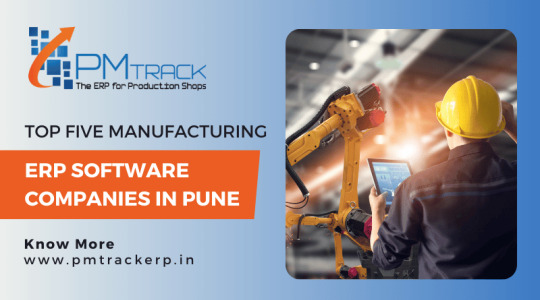
Are you looking for the top manufacturing ERP software companies in Pune to synchronize the processes in your manufacturing industry? If you search online, you can find numerous options, and it is very hard to choose the right one for your business. To make your selection process easier, we made a list of 5 best companies providing manufacturing ERP solutions in Pune. Through in-depth research and analysis based on customer reviews, years of experience, ERP benefits, and company profiles, this list has been prepared.
Here are the best 5 companies offering manufacturing ERP software in Pune:
1.PMTrack ERP:
Well-known as a leading ERP software company in Pune, PMTrack ERP has been serving its customers, especially in manufacturing businesses for many years. This company is recognized for its flexibility and integrated approach. It provides customized, end-to-end solution which is designed particularly for manufacturers.
Benefits of PMTrack ERP:
Designed especially for the manufacturing industry
Tailor-made modules and user-friendly interface
Can be easily integrated with third-party tools including CRM, accounting software, etc.Infor ERP:
Infor ERP is another known name in the market of cloud ERP software for the Manufacturing Industry. Renowned for its advanced manufacturing elements, this ERP has the capability to handle complex manufacturing operations.
Benefits of Infor ERP:
Fulfill unique demands of manufacturers with its tailored, industry-specific solutions.
Unified integration with AI, IoT, and analytics.
Offers cloud-based and on-premise alternatives.
2.Epicor ERP:
In Pune, Epicor ERP is also known for its scalability, flexibility, and increasing productivity for manufacturing companies. It provides ERP solutions that cover everything from supply chain management to finances and product management.
Benefits of Epicor ERP:
Whether you are dealing with automotive, electronics, or fabricated metal manufacture, Epicor ERP has specific solutions for every manufacturing industry.
Flexible options, including cloud-based and on-premise for deployment
Small, medium, or large industries can benefit from its easy-to-use interface that provides an enhanced user experience.
3.SAP Business One:
Renowned globally, including Pune, SAP Business One is a one-stop ERP solution for every small or medium-sized manufacturing company. It allows companies to simplify complex processes to enhance productivity and get in-depth insights.
Benefits of SAP Business One:
The main focus of this ERP software is to automate every process and reduce manual ones.
Its amazing feature of built-in CRM assists in managing customer relationships along with production procedures.
Another feature of a powerful reporting tool is that it is beneficial to get real-time business insights.
4.Odoo ERP:
Another name in the market of ERP software for the manufacturing industry that has recently gained popularity in Pune is Odoo ERP. This ERP is perfect for those companies that want to grow and evolve their ERP system with time.
Benefits of Odoo ERP:
Because of its open-source platform, this is the best choice for those who prefer customized solutions.
Enhanced user experience as it has an easy-to-use interface.
Budget-friendly ERP solution for all types of manufacturers.
5.Infor ERP:
Infor ERP is another known name in the market of cloud ERP software for the Manufacturing Industry. Renowned for its advanced manufacturing elements, this ERP has the capability to handle complex manufacturing operations.
Benefits of Infor ERP:
Fulfil unique demands of manufacturers with its tailored, industry-specific solutions.
Unified integration with AI, IoT, and analytics.
Offers cloud-based and on-premise alternatives.
How PMTRACK ERP Helps:
Manufacturing ERP software and systems are used to plan, manage, and deliver specific features that assist manufacturers and their business activities. Modern manufacturing ERP systems are designed to support and integrate seamlessly into any business process, resulting in a comprehensive business management platform for manufacturers.
It’s time to embrace the future of manufacturing with our cutting-edge business management solutions. Say goodbye to time-consuming manual methods in favour of a more effective approach that boosts output while cutting costs.
Our business solutions, designed specifically for the manufacturing sector, offer a comprehensive toolkit that streamlines all areas of production. Whether you’re managing inventory, optimizing supply chain logistics, scheduling manufacturing runs, or monitoring performance indicators, our solution offers a unified platform for success.
PMTRACK ERP offers the best all-in-one ERP software for manufacturing businesses. Our Manufacturing ERP software is specifically developed to connect core manufacturing business operations while lowering operational expenses for the manufacturing industry.
PMTRACK ERP is a cloud-based manufacturing software that boosts labour efficiency by providing integrated ERP solutions for manufacturing, MRP, BOM, production, planning, purchase, inventory, warehouse, sales, finance, CRM, HR & payroll, and more.
Conclusion:
Consider improving your manufacturing ERP system in Pune with new technology to manage manufacturing operations and business processes. As a result, your manufacturing company will experience cost reductions, increased profitability, and improved business intelligence and decision-making, all of which boost revenue and ROI.
PMTRACK ERP provides solutions that enable manufacturers to be intelligent, agile, and innovative in an ever-changing business environment. That means incorporating real-time reporting and visibility into business operations, the market, and your customers, allowing you to make informed decisions.
PMTRACK ERP software enables manufacturing organisations to respond to internal and external business changes with seamless efficiency. PMTRACK ERP systems not only assist manufacturers in effectively adapting to change and disruptors, but they also help them gain a competitive advantage.
If you are in Pune and looking for manufacturing ERP software in Pune to implement in your company that meets your business requirements, you can associate with these ERP providers in Pune.
#ERP solutions for manufacturing#manufacturing ERP software in Pune#ERP software#ERP software for manufacturing#cloud ERP software for the Manufacturing Industry
0 notes
Text
ERP Data Analytics in Manufacturing with the ERP Software for manufacturing industry. For growth and sales with ERP Manufacturing Software for Small Business, Precisely for ERP for Manufacturing Company in India.
0 notes
Text
#best erp solution oddo#oddo ERP for Manufacturing#benefits of oddo ERP for Manufacturing#custom oddo ERP development for Manufacturing insustry#oddo ERP for Manufacturing Industry#custom oddo development service providers#oddo custom development
0 notes
Text
Choosing the Best ERP Software Vendors in Singapore
Enterprise Resource Planning (ERP) systems are crucial for modern businesses. They integrate various functions, streamline operations, and enhance productivity. This article explores the leading ERP software vendors in Singapore, highlights the benefits of ERP solutions for manufacturing, and discusses the importance of an ERP system for retail business.
Why Choose ERP Software Vendors in Singapore?
Singapore is a global business hub known for its dynamic economy. Selecting the right ERP vendor in Singapore is critical for maximizing efficiency.
Local Expertise: Vendors in Singapore understand the local market. They provide tailored solutions to meet specific business needs.
Regulatory Compliance: ERP vendors ensure systems comply with local regulations. This reduces the risk of non-compliance penalties.
Continuous Support: Leading vendors offer ongoing support and updates. This ensures your ERP system remains efficient and secure.
Benefits of ERP Solutions for Manufacturing
Manufacturing businesses face unique challenges, including production planning, inventory management, and quality control. Implementing ERP solutions for manufacturing can address these challenges effectively.
Streamlined Production: ERP systems optimize production schedules. This reduces downtime and enhances productivity.
Inventory Control: Real-time inventory tracking minimizes stockouts and overstock situations. This ensures efficient use of resources.
Quality Management: Integrated quality control features ensure product consistency. This improves customer satisfaction and reduces returns.
Key Features of ERP Solutions for Manufacturing
When choosing an ERP solution for manufacturing, consider the key features that will benefit your business.
Scalability: The ERP system should grow with your business. It must adapt to increasing production volumes.
Customization: Look for ERP solutions that allow customization. This ensures the system meets your specific requirements.
User-Friendly Interface: A user-friendly interface reduces the learning curve. Employees can quickly adapt to the new system.
Importance of ERP System for Retail Business
Retail businesses require efficient systems to manage sales, inventory, and customer relationships. Implementing an ERP system for retail business offers numerous benefits.
Centralized Data: ERP systems centralize all business data. This improves data accuracy and accessibility.
Sales Optimization: Real-time sales data allows for better inventory management. This ensures popular products are always in stock.
Enhanced Customer Experience: Integrated CRM functionalities improve customer interactions. This enhances customer loyalty and satisfaction.
Choosing the Right ERP System for Retail Industry
Selecting the right ERP system for retail industry is crucial for maximizing benefits. Consider the following factors when making your choice.
Integration Capabilities: The ERP system should integrate seamlessly with existing retail systems. This ensures a unified workflow.
Mobile Access: Mobile access allows employees to use the ERP system on the go. This enhances flexibility and productivity.
Real-Time Analytics: Real-time analytics provide insights into sales and inventory. This aids in proactive decision-making.
Best Practices for Implementing ERP Systems
Implementing an ERP system requires careful planning and execution. Follow these best practices to ensure a successful implementation.
Define Clear Objectives: Set clear goals for what you want to achieve with the ERP system. This guides the implementation process.
Involve Key Stakeholders: Engage key stakeholders from the start. Their input ensures the system meets all business needs.
Thorough Testing: Conduct comprehensive testing before full deployment. This identifies and resolves any issues early.
Overcoming Common ERP Implementation Challenges
ERP implementation can present several challenges. Being aware of these helps in addressing them effectively.
Data Migration: Migrating data from legacy systems can be complex. Ensure thorough data cleansing and validation.
Change Management: Employees may resist change. Provide training and support to ease the transition.
Cost Overruns: Implementation costs can exceed budgets. Monitor expenses closely and adjust plans as needed.
Future Trends in ERP Systems
Stay updated with future trends to make the most of your ERP investment. Here are some trends to watch.
Cloud-Based ERP: Cloud-based ERP systems offer flexibility and scalability. They reduce the need for on-premise infrastructure.
AI and Machine Learning: AI and machine learning enhance ERP functionalities. They provide predictive analytics and automate complex tasks.
IoT Integration: IoT integration allows real-time data collection from connected devices. This improves operational efficiency and decision-making.
Conclusion
Selecting the right ERP software vendors in Singapore is crucial for modern businesses. Whether you need ERP solutions for manufacturing or an ERP system for retail business, the benefits are significant. ERP systems streamline operations, improve decision-making, and enhance customer experiences.
By following best practices for implementation and staying updated with future trends, businesses can achieve long-term success. Invest in a robust ERP solution to stay competitive and ensure your business thrives in today's dynamic market.
#erp software vendors singapore#ERP solutions for manufacturing#erp system for retail business#erp system for retail industry
0 notes
Text
Emerging ERP Trends Shaping the Future in 2024
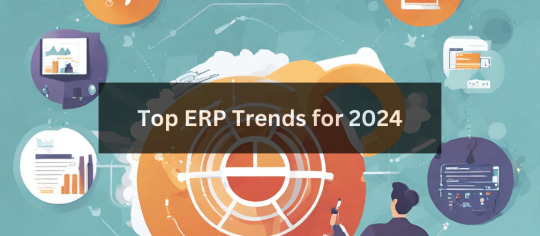
In today’s fast-paced business environment, Enterprise Resource Planning (ERP) systems have become essential for streamlining operations and providing a unified approach to managing various company processes. As we navigate through 2024, several key trends are transforming the ERP landscape, reflecting the ongoing technological advancements and evolving business needs.
Augmented Financial Efficiency:
SAP ERP solutions are becoming increasingly vital across diverse industries. These systems not only provide valuable insights into profitability, revenue, and cost but also incorporate advanced forecasting and predictive analytics. By leveraging machine learning algorithms, modern ERP systems can analyze historical financial data to offer precise predictions and recommendations, enhancing decision-making processes.
Cloud-First Approach:
The shift towards cloud-based ERP solutions is driven by their robust security, flexibility, and scalability. The subscription-based model associated with cloud ERP systems offers cost-effectiveness while facilitating real-time collaboration among teams spread across different locations. These systems also provide easy integration with various applications and ensure seamless upgrades.
Mobile ERP Solutions:
Mobile ERP applications have gained prominence due to their accessibility and functionality. They simplify tasks such as expense reporting, workflow approvals, and performance monitoring. The optimized user interfaces for various devices ensure a consistent experience across smartphones, tablets, and desktops, making ERP systems more versatile and user-friendly.
Integration of Machine Learning and AI:
Machine learning and artificial intelligence are now integral to ERP systems, enhancing capabilities such as fraud detection, predictive maintenance, and customer segmentation. Natural language processing features enable users to interact with ERP systems using chatbots and voice commands, streamlining queries and data entry processes.
IoT Integration:
The incorporation of the Internet of Things (IoT) into SAP ERP systems allows for real-time monitoring of assets like vehicles and equipment. This integration facilitates optimized resource utilization and proactive maintenance by analyzing data to identify inefficiencies and automate necessary actions.
Enhanced Security Measures:
Advanced encryption techniques, anomaly detection algorithms, and multi-factor authentication are crucial for safeguarding sensitive data within ERP systems. Regular security audits and continuous monitoring help ensure compliance with industry standards, offering a secure platform for businesses.
Focus on ESG and Sustainability:
SAP ERP modules now emphasize sustainability management, tracking key performance indicators related to carbon emissions, waste generation, energy consumption, and social responsibility. These analytical tools provide insights into the environmental and social impacts of business operations, supporting data-driven sustainability initiatives.
Quantum Computing and Blockchain:
Blockchain technology enhances transparency and traceability in transactions, particularly in sectors with complex regulatory demands and supply chains. Meanwhile, quantum computing promises faster data processing and improved encryption, potentially boosting the performance and security of ERP systems.
Broadening Operational Scope:
Modern ERP systems are expanding to integrate with third-party services and applications, supporting comprehensive end-to-end business processes. Integration of modules like customer relationship management, supply chain management, and business intelligence provides a unified view of organizational operations and performance metrics.
Conclusion:
In summary, these evolving ERP trends for 2024 illustrate the rapid advancements in technology and their impact on business operations. Companies that embrace these innovations will benefit from increased efficiency, adaptability, and improved decision-making. For organizations seeking to implement these latest trends, Cogniscient offers specialized ERP solutions tailored to meet specific needs and goals.
#SAP Business One#SAP B1#SAP Business One Partner in India#ERP for Manufacturing Industry#SAP ERP for Small Businesses#Best ERP software company in India#ERP Solutions Provider in India
0 notes
Text
How Manufacturers Can Manage Growth with ERP
Introduction:
In the dynamic landscape of manufacturing, where growth is the ultimate goal, the ability to adapt and streamline operations is paramount. Enter ERP (Enterprise Resource Planning), a powerful solution that has revolutionized the way manufacturers operate. In this blog, we'll explore the significant role of ERP software for manufacturing industry and how it serves as a catalyst for sustainable growth. Whether you're in traditional manufacturing or a software development company, ERP solutions are key to optimizing processes and managing growth effectively.
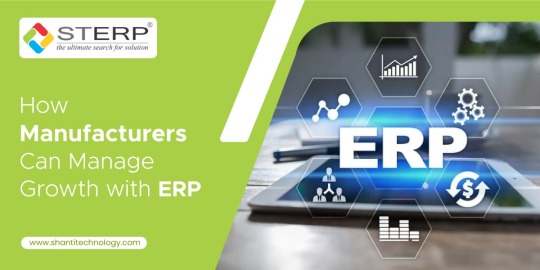
Understanding the Essence of ERP Software for Manufacturing:
1. Efficiency Unleashed:
ERP system for manufacturing industry is designed to enhance operational efficiency by integrating various business processes. From order management and procurement to production planning and inventory control, ERP systems bring together disparate functions into a unified platform, eliminating silos and enhancing overall efficiency.
2. Real-time Insights:
One of the key advantages of ERP solutions is the ability to provide real-time insights into business operations. Manufacturers can make informed decisions based on up-to-date information, helping them respond swiftly to market changes, manage resources effectively, and capitalize on growth opportunities.
3. Scalability Matters:
As a manufacturer, scalability is a constant consideration. Whether you're a growing traditional manufacturing unit or a software development company expanding its operations, ERP systems offer scalability to accommodate changing needs. The modular nature of ERP solutions allows businesses to add or modify functionalities as they evolve.
4. Improved Collaboration:
Collaboration is the bedrock of successful manufacturing. ERP fosters better communication and collaboration by providing a centralized platform where employees across different departments can access and share information seamlessly. This not only enhances teamwork but also accelerates decision-making processes.
ERP Software for Manufacturing Industry: Tailoring Solutions for Success
1. Production Planning and Scheduling:
In the manufacturing realm, effective production planning and scheduling are crucial for meeting customer demands and maintaining optimal inventory levels. ERP systems facilitate streamlined production processes, enabling manufacturers to create realistic production schedules, allocate resources efficiently, and minimize downtime.
2. Supply Chain Management:
A well-integrated supply chain is essential for manufacturers. ERP solution for the manufacturing industry ensures smooth coordination between suppliers, manufacturers, and distributors. This results in better inventory management, reduced lead times, and ultimately, improved customer satisfaction.
3. Quality Control:
Maintaining consistent product quality is non-negotiable in manufacturing. ERP solutions provide tools for comprehensive quality control by enabling real-time monitoring of production processes, tracking defects, and ensuring adherence to quality standards. This not only boosts customer confidence but also reduces wastage and rework costs.
4. Financial Management:
The financial aspect is the backbone of any business. ERP systems for manufacturing offer robust financial management capabilities, including invoicing, expense tracking, and financial reporting. This level of financial control is invaluable for manufacturers looking to manage growth effectively and make strategic financial decisions.
ERP for Software Development Company: Tailoring Solutions to Tech
1. Project Management:
For software development companies, managing projects efficiently is critical. ERP solutions designed for the software development industry offer project management modules that help track project timelines, allocate resources effectively, and ensure that development projects stay on course.
2. Resource Planning:
In the software development realm, talent is a primary resource. ERP systems tailored for software companies facilitate resource planning by providing insights into employee availability, skills, and project commitments. This ensures optimal resource allocation for project success.
3. Version Control and Collaboration:
Version control and collaboration are key aspects of software development. ERP solutions for software companies include features that enable version control, code collaboration, and documentation management. This ensures that development teams work cohesively, leading to efficient project outcomes.
4. Compliance and Security:
In the software development industry, compliance and security are paramount. ERP systems for software companies often include modules that help manage compliance with industry standards and ensure data security. This is especially crucial in an era where data protection is a top priority.
Conclusion:
As manufacturers navigate the complexities of growth, ERP software emerges as an indispensable tool for success. Whether you're in traditional manufacturing or a software development company, the benefits of ERP systems are far-reaching. From enhancing operational efficiency and providing real-time insights to tailoring solutions for specific industry needs, ERP is the key to managing growth effectively. Embrace the power of ERP, and propel your manufacturing operations into a future of streamlined processes, informed decision-making, and sustained success.
#Go-To-Market#GTM#Supply-Chain-Management#Technology#India#ERP-India#ERP#Business-Solutions#Manufacturer#Engineering#Inventory-Management#ERP Software for Manufacturing Industry#ERP System for Manufacturing Industry#ERP for Software Development Company#ERP Solutions for Manufacturing
7 notes
·
View notes
Text
ERP solutions for manufacturing
Streamline your manufacturing processes with our top-rated ERP solutions designed specifically for the industry. Our ERP systems offer robust features to optimize production, manage inventory, and improve efficiency. Gain real-time insights, enhance productivity, and reduce costs with our comprehensive ERP solutions tailored for manufacturing businesses. Embrace innovation and stay competitive with cutting-edge technology that adapts to your unique needs. Explore our ERP solutions today and transform your manufacturing operations for a smarter, more efficient future.
0 notes
Text

How can Odoo Manufacturing revolutionize my production process?
Imagine having a magical toolkit that transforms your manufacturing process into a seamless, efficient operation. That's what Odoo Manufacturing offers. With real-time production tracking, smart inventory management, and advanced quality control, Odoo ERP revolutionizes how you manage your production.
At BizzAppDev Systems, we specialize in bringing this magic to life for your business. Our expertise ensures smooth integration, turning your manufacturing process into a well-oiled machine.
Key Highlights:
Instant Insights: Make data-driven decisions with real-time production tracking.
Smart Inventory: Maintain the perfect balance—no more overstocking or shortages.
Quality Assurance: Ensure every product meets the highest quality standards.
Ready to experience the magic? Let's get started with Odoo Manufacturing and BizzAppDev Systems. ✨
#OdooManufacturing #ManufacturingMagic #BizzAppDev #Innovation #SmartManufacturing #ERP
#manufacturing software#manufacturing industry#manufacturing#businessgrowth#odoo#business#erp solution#odooimplementation#efficiency#odoo erp#crm software#business growth
0 notes
Text
SAP Business One Gold Partner Noida |Delhi |Gurgaon| Ghaziabad India
Elevate your interior decor and furniture manufacturing business with SAP Business One Take control of your success
Trusted SAP Business One Gold Partner with 500+ Successful Implementations including Kanpur, Jaipur, Lucknow, Ludhiana, Manesar, Indore, Pune, Mumbai, Kolkata, Faridabad, Sonipat, Raipur, Ambala Etc.
#SAP Business One#SAP B1#SAP Business One Partner in India#ERP for Manufacturing Industry#SAP ERP for Small Businesses#SAP ERP for Food & Beverages#Best ERP software company in India#ERP Solutions Provider in India#Best ERP Software in India
0 notes
Text

Odoo ERP For the Manufacturing Industry
Unlock the full potential of your manufacturing operations with Odoo ERP! Streamline production, optimize inventory, ensure quality control, and manage your entire supply chain with the best Odoo ERP Solutions for the Manufacturing Industry in the UAE, Contact us for more information.
Key Features of the Manufacturing ERP
Production planning and scheduling
Inventory management and control
Quality control and compliance
Seamless supply chain management
Financial management and cost control
Real-time data and analytics
Scalable and customizable solutions
Visit Transines to learn more and schedule an Odoo consultation with our experts. Transform your manufacturing business with Odoo ERP today!
1 note
·
View note